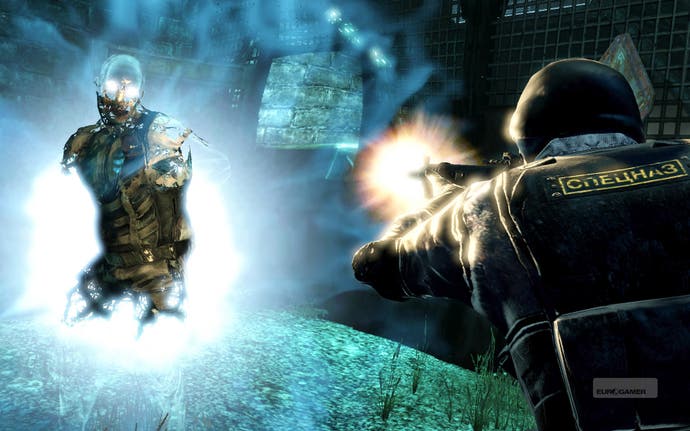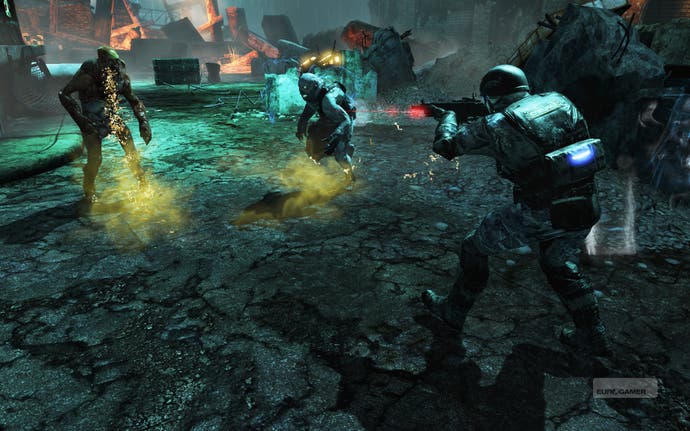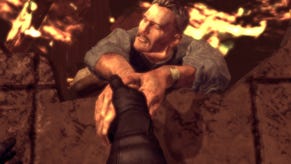E3: Singularity
Rifty business.
All of that seems to be a lot of fun, and Raven can presumably be relied upon to craft anther competent blaster. More interesting, however, is the role time-manipulation plays in the game's puzzles, the examples I'm shown giving you the ability to take a wall that's blocking your path and fast-forward it until it's fallen down, rewind a collapsed staircase to the point where it was brand new, and even bring shattered crates back to life in order to get ammo out of them. (The latter is undeniably a nice spin on the ol' crates-in-games routine, but you can't help feeling if the developer knew the ol' crates-in-games routine was so dull in the first place, it could have just done away with it entirely.)
Later on, the TMD receives an upgrade which allows it to show you items trapped outside of your own timeline, which enables you to fit spooky trans-dimensional fuses into real-world circuit-boxes in order to open doors, or pull a girder through from a parallel universe to get across a broken bridge.
Only certain items can be chronologically tampered with, and Raven handily picks them out for you with a glowing aura. You can only crumble a section of brickwork if the game's made sure there's something waiting for you on the other side, in other words, and a staircase can only be reconstructed if the designer has built it with that in mind. While this stops the game from becoming a confusing mess, it will also make things rather contrived if Raven isn't exceptionally skilful in deploying the smoke and mirrors - and as we've only been shown a handful of simple puzzles so far, it's hard to tell how well Singularity subsequently riffs on its basic ideas.

At the moment, though, there's a sense that this is a game that's always anxiously reaching for greatness. Like the shadows flitting about the Null Zone, nestled in amongst concrete evidence of the likable, slightly predictable experience Singularity currently appears to be, you can see regular hints of the titles it aspires to become - its time-bending weapons eager to bring with them the puzzley creativity of Portal, while its narrative, told in snatches of trans-dimensional conversations with 1950s scientists and tape-recordings uncovered in the present day, calls to mind the careful scrapbook approach of BioShock.
And, to its credit, Singularity has shown a handful of promising moments to date. A cut-scene in which a vast crumbled laboratory is resurrected from its own rubble effortlessly summons all the magic of time travel, while an echo-zone replaying the same five seconds of 1950s soldiers being ripped apart by an explosion is genuinely creepy. There's hope for the combat, too, with strange lizard-type baddies who retreat into the Null Zone in-between attacks adding a little variety to the standard Russian soldiers you're up against, and the island's own mutated flora and fauna posing increasingly deadly threats as you head deeper into the adventure.

Raven rarely makes bad games, but it doesn't always make entirely memorable ones, and Singularity is currently looking solid, colourful, and a little derivative. If the designers can mesh their skill at combat with puzzles that offer genuine surprises, rather than simple variations on locks and keys, there's a distinct chance they could be onto special.
Until we've seen that, however, it's ultimately rather hard to say if this chronology-bending shooter is going to be worth very much of your time.
Singularity is due out for PC, PS3 and Xbox 360 later this year.





.png?width=291&height=164&fit=crop&quality=80&format=jpg&auto=webp)




.jpg?width=291&height=164&fit=crop&quality=80&format=jpg&auto=webp)